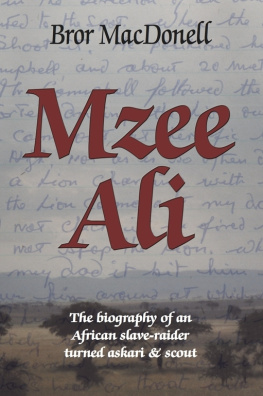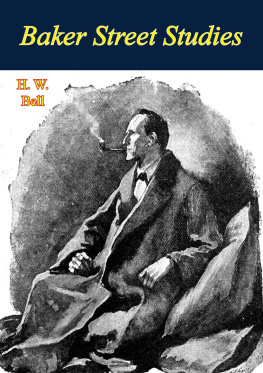Bror Macdonell - Mzee Ali
Here you can read online Bror Macdonell - Mzee Ali full text of the book (entire story) in english for free. Download pdf and epub, get meaning, cover and reviews about this ebook. year: 2013, publisher: 30° South Publishers, genre: Non-fiction. Description of the work, (preface) as well as reviews are available. Best literature library LitArk.com created for fans of good reading and offers a wide selection of genres:
Romance novel
Science fiction
Adventure
Detective
Science
History
Home and family
Prose
Art
Politics
Computer
Non-fiction
Religion
Business
Children
Humor
Choose a favorite category and find really read worthwhile books. Enjoy immersion in the world of imagination, feel the emotions of the characters or learn something new for yourself, make an fascinating discovery.
- Book:Mzee Ali
- Author:
- Publisher:30° South Publishers
- Genre:
- Year:2013
- Rating:3 / 5
- Favourites:Add to favourites
- Your mark:
- 60
- 1
- 2
- 3
- 4
- 5
Mzee Ali: summary, description and annotation
We offer to read an annotation, description, summary or preface (depends on what the author of the book "Mzee Ali" wrote himself). If you haven't found the necessary information about the book — write in the comments, we will try to find it.
Mzee Ali — read online for free the complete book (whole text) full work
Below is the text of the book, divided by pages. System saving the place of the last page read, allows you to conveniently read the book "Mzee Ali" online for free, without having to search again every time where you left off. Put a bookmark, and you can go to the page where you finished reading at any time.
Font size:
Interval:
Bookmark:


Bror rme MacDonell

eBook published in 2013 by:
30 South Publishers (Pty) Ltd.
16 Ivy Road, Pinetown
South Africa
www.30degreessouth.co.za
Copyright The Estate Bror rme MacDonell, 2006
eBook The Estate Bror rme MacDonell, 2013
Design, origination & maps by 30 South Publishers (Pty) Ltd.
Printed and bound by Pinetown Printers (Pty) Ltd.
All rights reserved. No part of this publication may be reproduced, stored, manipulated in any retrieval system, or transmitted in any mechanical, electronic form or by any other means, without the prior written authority of the publishers. Any person who engages in any unauthorized activity in relation to this publication shall be liable to criminal prosecution and claims for civil and criminal damages.
9781928211013
Mzee Ali has been a labour of love. Gavin MacDonell first approached me with his late fathers manuscript in early 2005 and gave me the background to this remarkable account of a grand old man of Africa. In the late 1940s, Bror Urme MacDonell was employed in the British colonial service by the Department of Locust Control, covering southern Tanganyika and the northeastern corner of Northern Rhodesia. It was here in the bush, sitting around the campfire at night and listening to the stories of his lead scout, that he had the presence of mind to take notes.
The notebooks emerged some fifteen years later in 1963 while Bror was living in Salisbury, Southern Rhodesia. He began writing Mzee Ali in longhand and, a decade later, dictated the account to Stella Townsend, who faithfully typed the manuscript, with her comments that the text was too factual and lacked colour. She was right, but at the time Brors primary aim was to get the facts down. Here, the publishers, on behalf of the authors family, would like to express their heartfelt thanks and gratitude to Stella.
When Gavin gave me Stellas typed-up manuscript I read it in one sitting, through the night till dawn. It absorbed me totally and I knew we had something that was wonderfully unique. I passed the manuscript on to my wife and partner, Kerrin, and she too read it in a single sitting, with her comments (like Stellas) that the manuscript needed a significant rewrite in order to bring the story alive. And thats what she did, solidly for three monthsshe transcribed the text electronically and at the same time rewrote the story of Mzee Ali, making it her own and drawing on her personal experiences of Tanzania and its wonderful people. She faced some daunting challenges, not least of which was trying to untangle the confusing timelines of Mzee Alis youth in the closing decades of the 19th century. (The Western calendar differs from the Islamic calendar, neither of which a century ago held meaning to an Africans interpretation of time and past.) Place names and spellings have also changed in a century and tracing the routes of the slavers and of the German askaris of World War I was no easy task. However, Kerrins greatest challenge was to get inside the mind of Mzee Ali, and, as biased as I might be, I believe she has produced something very special.
Inevitably, the story has been drawn with an element of licence. However, the facts, as related by the Mzee to the author, have been faithfully reproduced. But memory dims with time and some facts as have been recorded may be historically inaccurate. This is unimportantwhat matters is that a miniscule speck of Africas vast, untapped history, the story of one man to be precise, has been written down. On a continent where the past and its traditions are passed down through song and story-telling, Mzee Ali stands out as a written tribute to a long-forgotten era that captures the richness, the beauty, the cruelty and the very soul of Africa.
Our hope is that Mzee Ali will transport you back to a time and place of long agoon a safari or by a campfireand that you will come away with the same feelings of warmth and respect that we have experienced.
Chris Cocks
Johannesburg, February 2006
From lightning and tempest; from plague, pestilence, and famine; from locusts, murrain, and drought; from battle and murder, and from dying suddenly and unprepared, Good Lord, deliver us.
The Litany

Slave-trade route circa 1890

Askari route 19151918

I wrote the story of Mzee Ali from notes while on safari in some of the most remote and infrequently visited parts of western Tanganyika (now Tanzania), sitting around the campfire in the company of locust scouts, of whom Mzee was a member.
Much of the country, because of the rough terrain and absence of roads, was traversed on foot with porters to carry the expeditions requirements. Mzees presence on these ventures into this unknown, unmapped and unsurveyed country was essential. Mzee had many years experience in this type of work and an unrivalled knowledge of the bush; at times it seemed he could literally smell a distant water point.
On a more personal level it was Mzee who encouraged me to explore further into these wilds and delve deeper into the memories of an old grey-haired gentlemans mind, the mind of a noble African generation.
Mzee told his story as the truth and there was little or no reason to disbelieve its authenticity. He stood tall and strong, his years etched on his face and his life etched on his soulthe figure of courage, strength and loyalty. He remained calm and clear-minded when our camp was visited at night by unwelcome lions, or by an elephant breaking the bough of the tree under which we slept. He had been raised not to panic when the unexpected happened. In his early years he was taught and expected to bring order to a confused and frightened army of porters, slaves and scouts, awoken in the same manner.
My final farewell to this fine old man of wild Africa was while camping in the bush some twenty miles from Usenge. I raised my glass and toasted the Old People of Africathe people who had helped build a kaleidoscope of history in Africa and to Mzee Ali Kalikilima.
Standing, as always, erect with great dignity on a bright moonlit night, he turned, shook hands and said, Kwa heri bwana. He took a moment to survey the campsite and the many people sitting around the blazing fire, as if trying to read the future in the tongues of the flames or shadows cast against a nearby anthill, and said goodbye to his companions.
The rolling sound of a lions roar coming from a long way off, the bark of a scrounging jackal nearby, the laugh of hyena and the distant trumpet of an elephant, seemed to draw the curtain closed behind the fading figure of a true man, returning to his home to rest.
He is, and was, Africa. May Allah grant him sanctuary in his heaven.
Font size:
Interval:
Bookmark:
Similar books «Mzee Ali»
Look at similar books to Mzee Ali. We have selected literature similar in name and meaning in the hope of providing readers with more options to find new, interesting, not yet read works.
Discussion, reviews of the book Mzee Ali and just readers' own opinions. Leave your comments, write what you think about the work, its meaning or the main characters. Specify what exactly you liked and what you didn't like, and why you think so.





